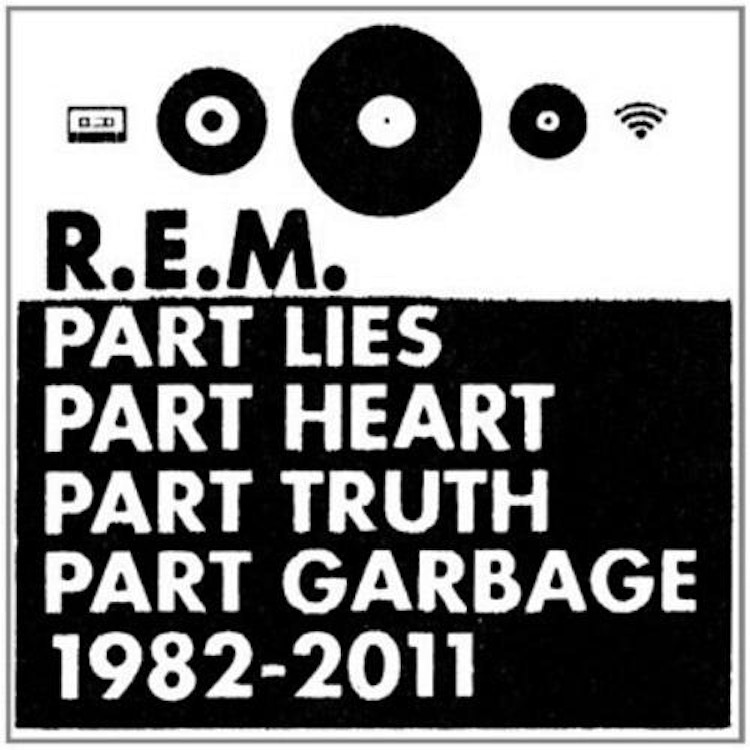"Part Lies, Part Heart, Part Truth, Part Garbage 1982–2011"

Let’s start at the end. As seems appropriate for a “best of” compilation both of this size – forty tracks – and for this most storied and sprawling of careers, there are all of three new tracks. ‘A Month Of Saturdays’ sounds like one of those innumerable Robert Pollard power-pop stylistic exercises, right down to its 1:40 length, if Pollard ever reduced himself to writing about how great the weekend is; ‘We All Go Back To Where We Belong’ is a wistful remembrance of things passing, boasting a Jimmy Webb-like lounge-pop arrangement and a baritone guitar mini-solo; and ‘Hallelujah’ isn’t, thankfully, that ‘Hallelujah’ but an undistinguished low-tempo saunter led by acoustic guitar and bashed along by big drums. None are essential, but it’s only after realising this that you realise what they must have left off to accomodate them – no ‘Drive’, no ‘Find The River’, no ‘E-Bow The Letter’, no ‘Pretty Persuasion’ or ‘Cuyahoga’ or ‘Turn You Inside Out’ or ‘How The West Was Won And Where It Got Us’ or ‘Hope’ (well, I liked it) or… yeah. Trying to pick and choose from a catalogue this large is best left to experts.
A strange thing, if understandable when seen the right light, happened when R.E.M. announced their dissolution on 22 September. A substantial part of the debate about their legacy on Twitter and message boards centred on their last five albums over the preceding decade and how patchy and past it they were. As an immediate reaction to their legacy it was almost as if they needn’t have bothered with the nineteen years and ten albums of music that at its peak was matchless, and that helped drag the entire alternative scene through different phases (there was no such thing as a touring network when they started, for example) and eventually to the top of the mountain. The first compilation to draw from both their IRS and Warner Bros phases, Part Lies… takes the extensive chronological view, taking family favourites and deep album cuts alike to give an overview of a band who didn’t so much grow up and become the mainstream as expand their reach and drag the mainstream towards their unique complexities. How keen are the band and Warners to explore every facet of the journey? They’ve included that which hitherto remained unspoken, ‘Shiny Happy People’.
Actually, the album is not quite chronological, as the Hib-Tone release of ‘Radio Free Europe’ has been glossed over and instead the Murmur version comes after ‘Gardening At Night’ from the Chronic Town EP. Regardless, rarely can a new band’s singular mystique have been set so solidly from the off. Peter Buck’s Rickenbacker chimes and arpeggiates like an electrified Byrds transported to the basement party scene and made to fend for itself; the tight, limber rhythm section drives and rolls with the punches while Michael Stipe… well, occasionally you can make out a syllable, and when you find out the impressionistic lyrics he might as well have been singing for the sake of it. Give or take some intelligibility, some would go on to make a whole scene out of this West Coast-derived sound, the briefly popular mid-80s Paisley Underground that spawned the Bangles and the Rain Parade among others.
By then, having perfected the art, R.E.M. were already moving along. Their Southern mythology album Fables Of The Reconstruction saw them take on English folk rock influences and actual scene-setting and storytelling. By Life’s Rich Pageant Stipe’s words are actually mixed somewhere near the front so as for most of the words to be properly audible at last, and to coincide those lyrics began to reflect the politics taking root around them:’Begin The Begin’ namechecks Pilgrims commander Myles Standish as it wonders whether progress is automatically good, ‘Fall On Me’ circles round the lines “Buy the sky and sell the sky”, as well as containing the first great Mike Mills backing vocal. All this self-examination leads up to three defining moments from Document. ‘The One I Love’, misleading couples who might consider it their song, and ‘It’s The End Of The World As We Know It (And I Feel Fine) ”s frantic ‘Subterranean Homesick Blues’ for the Contra age have both been well played out and picked over but ‘Finest Worksong’ is subtly different again, as against a beat like a hammer metronomically hitting the anvil Buck plays like his guitar strings are made out of sheet metal and Stipe calls to arms with the rallying slogan “What we want and what we need has been confused”.
There are those that will tell you that giving themselves over to the major label dulled the band on the spot, who hoped Stipe might one day start being unintelligible again. In fact, it was more like they now had the resources to do what they wanted, the four Green cuts demonstrating a clear influence from bubblegum pop but also including, in ‘Pop Song 89′, an attempt at writing an entirely vague radio-friendly song and, with ‘Orange Crush’, an inscrutable yet still explicit political statement, referring to the Vietnam chemical defoliant Agent Orange that takes a Gang Of Four barbed wire guitar sound to the huge halls if not quite – yet – stadia.
And after that, Out Of Time. There’s no turning back now. Yet even among that and Automatic For The People‘s globe-straddling, radio-colonising hits there were moments of melancholy, loss and lust, to which end the representation is about as spot on as could be. Between ‘Losing My Religion’ – a massive anthem of the universal feeling of unrequited lust that lives in existential fear and, oh yes, is led by mandolin – and ‘Shiny Happy People’ comes, almost certainly very deliberately, ‘Country Feedback’, a song with heavy Neil Young musical overtones that takes a string of fractured half-memories and turns them into emotional flux, delivered by a Stipe who is as unsure of himself as he can be. The way he sings “I need this”, at the end of his tether amid personally responsible emotional turmoil, might be his greatest single vocal moment.
Awkwardly the first disc ends just as the selections from Automatic For The People – the four big obvious ones, though don’t overlook ‘Nightswimming’s use of precise detail to heighten the sentiment and the passing of youthful opportunity – start. That means once you’ve had to switch discs we hit (in the received R.E.M. opinion) the down slope, not that track choice here helps entirely. Monster‘s post-Cobain, post-glam use of distorted guitars and Stipe’s growing angst at feeling at the outside of everything would never fit well into any retrospective, which may be why only ‘What’s The Frequency, Kenneth?’ represents it here. Reflexive dismissal at the time of New Adventures In Hi-Fi, not least for its being largely recorded at soundchecks and in hotel rooms, has left it as the great underrated R.E.M. record, but choosing the one-paced ‘New Test Leper’ and the lost-sounding home thoughts from above ‘Electrolite’ won’t automatically change that view. Similarly the great post-Bill Berry experiment in electronics, textures and doing what they thought we wanted Up is only represented by the straightforwardly sentimental Beach Boys-alike ‘At My Most Beautiful’. Then again, that song is a rare opportunity to catch Stipe at his straightest, with a lyric built on the small details and backed by some loving harmonies.
Having got through fourteen years in 27 tracks, the last twelve years of the band’s studio album career take up ten tracks, two of which (‘The Great Beyond’, which hasn’t aged well, and openly admitted ‘It’s The End Of The World…’ rewrite ‘Bad Day’) were standalone singles. Most of these pale in comparison, usually through an attempt to recapture past glories by a band who must subconsciously have known that they would be providing the “piss break moments” in their football stadium gigs. Then suddenly in 2008 comes ‘Living Well Is The Best Revenge’ from Accelerate, raging like the back catalogue rarely has. as Stipe fights the demagoguery of the Bush administration. Obviously it doesn’t last, but of the three (!) samples from Collapse Into Now, the highlight – ’Uberlin -’ harbours a desire for escape and living it up.
Listening in retrospect and at the end of a surf through 29 years of questing and flux, ‘Uberlin’ and ‘Oh My Heart’, in which the narrator returns to what is clearly a post-Katrina New Orleans (“The storm didn’t kill me, the government changed”), have the feel of someone finally in a place of satisfaction. That they were still producing work of this quality so late on, especially just after a severe quality dip, would be enough. That along the way they showed an entirely new way to the community from which they came, while producing what is and will remain some of the most influential re-examinable music of the alternative rock era… well, they’ve earned their place and then some.
Get the Best Fit take on the week in music direct to your inbox every Friday

Wet Leg
moisturizer

MF Tomlinson
Die To Wake Up From A Dream

BIG SPECIAL
National Average






